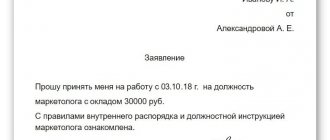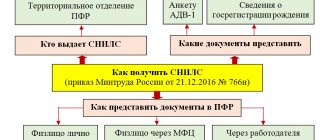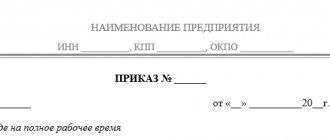Who should not be subject to a probationary period?
The conditions and procedure for establishing a test for an employee when hiring are provided for in Article 70 of the Labor Code of the Russian Federation. The same article prohibits the establishment of a probationary period for persons:
- persons applying for positions through competition;
- pregnant women and women with children under 1.5 years of age;
- persons under the age of 18;
- persons who have received specialized secondary or higher education in state-accredited educational programs and are entering work for the first time in the acquired specialty within 1 year from the date of receiving vocational education;
- persons elected to elective positions for paid work;
- persons invited to work by way of transfer from another employer as agreed between employers;
- persons hired for a period of up to 2 months;
- other persons whose circle is established by law or collective agreement.
Important! The provision for establishing a probationary period must be contained in the employment contract and in the employment order. If the employer does not reflect the condition of the test in the contract, then it will be considered that the test is not established, and the employee is finally accepted into the organization from the date established in the employment contract, or from the date of conclusion of the contract.
It is possible that the employer, when establishing a probationary period, did not know that the employee was classified as a person for whom a probationary period cannot be established.
Later, during the probationary period, this fact was established. In such cases, even if the employee did not meet the employer’s expectations and requirements during the test, his dismissal is impossible on the basis of “unsatisfactory test results.” In this situation, if an employee is fired due to failure to pass the test and subsequently goes to court with a corresponding statement of claim, the employer’s actions will be declared illegal and the employee will be reinstated. The employer will not be “saved” even by the fact that the employee deliberately did not inform about the impossibility of establishing a probationary period for him.
When hiring a single father raising a child under one and a half years old, the question may arise as to whether the above rule applies to such a father, since the Labor Code of the Russian Federation contains a prohibition that applies only to mothers. The answer to this question was given by the Supreme Court of the Russian Federation in its Resolution of the Plenum of January 28, 2014 No. 1 “On the application of legislation regulating the work of women, persons with family responsibilities and minors” (hereinafter referred to as Resolution No. 1). According to paragraph 9 of Resolution No. 1, it is prohibited to establish a hiring test for pregnant women, women with children under the age of one and a half years, and this also applies to other persons raising children under the age of one and a half years without a mother. If such employees have been assigned a test, then termination of the employment contract with them based on the results of the test is not allowed.
Question 23. The procedure for establishing a test when hiring.
A probationary period can be assigned to an employee only by mutual agreement between him and his employer. A provision on a probationary period must be included in the employment contract when it is drawn up, otherwise the employee will be considered hired without a probationary period. If an employee starts work without drawing up an employment contract, then the probationary period condition can be included in the employment contract later (if the parties entered into an agreement on the appointment of a probationary period before starting work). In the hiring order, it is necessary to fix the condition of a probationary period (Part 1, Article 68 of the Labor Code of the Russian Federation. The procedure for establishing a probationary period for an employee when hiring is determined by Part 1 and Part 2 of Article 70 of the Labor Code of the Russian Federation.
As a general rule, the duration of the trial should not exceed three months, however, there are exceptions for a number of categories of employees (according to Part 5 of Article 70 of the Labor Code of the Russian Federation), according to which the probationary period can be increased to six months. These employees include:
· heads of organizations and their deputies;
· chief accountants and their deputies;
· heads of branches, representative offices and other separate structural units.
If an organization enters into an employment contract for a period of two to six months, then the probationary period for a newly hired employee cannot exceed two weeks (Part 6 of Article 70 of the Labor Code of the Russian Federation). The test is not established at all when concluding an employment contract for a period not exceeding two months (Part 4 of Article 70, Article 289 of the Labor Code of the Russian Federation).
During the probationary period, there is not a period of temporary disability and other periods of actual absence of the employee from work (Part 7 of Article 70 of the Labor Code of the Russian Federation). After the break, the probationary period will continue.
There are a number of categories of citizens for whom it is impossible to establish a test when hiring (according to Part 4 of Article 70 of the Labor Code of the Russian Federation). These include:
· employees applying for work through a competition;
· pregnant women and women with children under the age of 1.5 years;
· employees under 18 years of age;
· young specialists entering work in their specialty for the first time within one year from the date of graduation from an educational institution;
· employees elected to an elective paid position;
· employees invited to work as a transfer from another organization.
In addition, the test is not established when concluding an employment contract for a period not exceeding two months (Part 4 of Article 70, Article 289 of the Labor Code of the Russian Federation). In addition, it is impossible to establish a probationary period for an employee who has successfully completed training under an apprenticeship contract (Part 1 of Article 207 of the Labor Code of the Russian Federation).
If the employee fails the test, the employment contract is terminated. The employee must be notified that he has not passed the test at least three days before dismissal, in accordance with the established rules in Part 1 of Art. 71 of the Labor Code of the Russian Federation. In this case, the employer must:
· communicate your decision in writing;
· indicate the reasons for the decision made.
If an employee refuses to sign a notice of dismissal, it is necessary to draw up a corresponding act of refusal.
Evidence of an employee's unsatisfactory performance may include:
· memos from his immediate supervisor;
· complaints from clients and colleagues;
· reports that the new employee does not meet production standards or does not meet time standards;
· written reports from the employee on the completion of tasks.
Evidence may also include documentation of the disciplinary offense (explanatory note, acts, order to impose penalties). Moreover, all of the above documents will have the force of evidence only if the employee has been familiarized with his duties, standards, and labor regulations (Part 3 of Article 68 of the Labor Code of the Russian Federation).
The dismissal procedure follows the general rules for terminating an employment contract at the initiative of the organization. In the employee’s work book, it is necessary to make an entry about dismissal on the basis of Art. 71 of the Labor Code of the Russian Federation. An employee cannot be fired on this basis during the period of vacation or sick leave (Article 81 of the Labor Code of the Russian Federation).
If the employee passes the test, he continues to work. According to Part 3 of Art. 71 of the Labor Code of the Russian Federation, no additional orders should be issued.
If an employee decides to quit on his own, he needs to notify the employer of the termination of the employment contract three days before dismissal (Part 4 of Article 71 of the Labor Code of the Russian Federation). An employee writes a letter of resignation. Until the three-day period has expired, he has the right to withdraw the application. In this case, dismissal will not occur. According to the procedure specified in Art. 80 of the Labor Code of the Russian Federation, an employee cannot withdraw an application if the organization has already invited a new employee to a vacant position (for example, by transfer from another organization) who cannot be refused to conclude an employment contract.
Question 24. Form of employment contract. Registration of employee reception. Entry into force of the employment contract.
Determining the moment of entry into an employment contract is an important guarantee of workers’ rights. Entry into force means the moment from which the employment contract begins to operate, apply, and entail legal consequences for the parties. The concept of “entry into force of an employment contract” in its content basically coincides with the concept of “conclusion of an employment contract”. An employment contract that has entered into force is a contract “concluded” properly, or in the case provided for in Part 2 of Art. 67 of the Code, an employment contract that is “considered concluded.” The concluded employment contract is the legal basis for registration of employment in accordance with Art. 68 of the Code.
According to Art. 61 of the Code, an employment contract comes into force from the day it is signed by the employee and the employer, unless otherwise established by federal laws, other regulatory legal acts or the employment contract, or from the day the employee is actually admitted to work with the knowledge or on behalf of the employer or his representative.
So the general rule is that:
1) the employment contract comes into force from the day it is signed by the employee and the employer;
2) from the day the employee is actually admitted to work with the knowledge or on behalf of the employer or his representative.
The most often used is the first option for the employment contract to enter into force, that is, after signing. But situations are possible when another day for the entry into force of the contract is provided for by the employment contract itself (for example, the contract was signed on March 1 and in it the parties made a reservation about the entry into force of the contract on March 10). Or there may be cases when federal laws and other legal acts (but not laws, but other acts of constituent entities of the Russian Federation) directly stipulate the moment the employment contract comes into force. Thus, in cases where the appointment of an employee requires subsequent confirmation of his position (Article 19 of the Labor Code of the Russian Federation), the day of signing the employment contract and the day of its entry into force do not coincide.
The second of these options may occur in cases where the employment contract was not properly drawn up, but the employee actually began work with the knowledge or on behalf of the employer or his representative. In such cases, the employer is obliged to draw up an employment contract with the employee in writing no later than three days from the date of the employee’s actual admission to work (Part 2 of Article 67 of the Labor Code of the Russian Federation).
The rules for determining the beginning of practical performance by an employee of the duties assigned to him by an employment contract that has entered into force are established in Articles 2 and 3. 61 Code. The employee is obliged to begin performing his job duties on the date specified in the employment contract. If the employment contract does not directly specify the start date of work (regardless of the reasons), the employee must begin work on the next day after the day the contract enters into force.
The day on which the employee is obliged to begin performing his job duties must be established by the employment contract. Based on the concluded employment contract, the employer issues an order (instruction) on hiring. The employee is considered hired from the date specified in the order, which must correspond to the start date of work provided for in the employment contract.
If the parties to the employment contract do not stipulate the start date of work when concluding it, a mandatory norm is applied - “the employee must begin work on the next working day after the employment contract comes into force.”
If the employee does not start work on time without good reason within a week, the employment contract is canceled. This rule is established by Part 4 of Art. 61 of the Code for the first time. Cancellation of an employment contract practically means that such a contract is recognized as non-existent and does not entail legal consequences for the parties from the date of its conclusion. The “established deadline” here should be understood as the day the work begins, determined according to the rules of Parts 2 and 3 of Art. 61, which we set out above. The course of the one-week period provided for in Part 4 of Art. 61 of the Code, begins from the day the work was supposed to begin.
The phrase “did not start work” used in the norm under consideration implies not only the absence of the employee from the workplace during working hours. An employee may be at work, but not begin to perform his or her job duties.
The fact that an employee fails to fulfill his job duties within a week from the date of the expected start date of work can be certified by drawing up an appropriate act. If the employee does not provide evidence of valid reasons for failure to fulfill his duties during this period, then on the basis of this act it is possible to issue an order (instruction) of the employer canceling the previously issued order to hire the relevant employee.
In practice, the application of this norm of Art. 61 of the Labor Code of the Russian Federation may become even more complicated when the following circumstances arise. The employee warned the employer within the prescribed week that he had suffered a domestic injury and would be absent for a valid reason for at least a month. The Labor Code of the Russian Federation does not provide for a suspensive condition for the entry into force of an employment contract or its unilateral cancellation under such or similar circumstances.
This raises the question: what period of time should a warned employer wait for an employee who does not start work for a good reason. This issue is not resolved in the Labor Code of the Russian Federation. The law enforcer can fill the legal gap that has arisen by using another rule of law in a given branch of law that regulates similar legal relations, and in its absence, a similar rule of law in other branches of law. In the absence of such norms, the law enforcement officer must act in accordance with the fundamental (constitutional) principles of the law of a given state. Based on these principles, the employer, having not found analogies of the law or right, in my opinion, not only can, but also must, taking into account the opinion of the representative body of employees (see Part 2 of Article 8 of the Labor Code of the Russian Federation), issue an appropriate local normative act that will act until the adoption of a state regulatory legal act that eliminates the above gap. Which will stipulate that if the employee does not start work on time and does not notify the employer in writing within a week of a valid reason for his absence, the employment contract may be canceled by the employer. In the event of the absence of an employee who has notified the employer in writing of a valid reason for his absence for more than a week (or another period reasonable for the employer) from the date of this warning, the employer has the right to cancel the employment contract by notifying the employee in advance. The contract is canceled from the date the employer receives confirmation that the employee has been officially notified of the cancellation of the contract.
In this case, the local act will comply with the requirements of Art. 5 and 8 of the Labor Code of the Russian Federation, that is, it will not contradict the norms of higher acts of labor legislation (due to their absence) and will not worsen the situation of workers in comparison with the norm of Part 4 of Art. 61 of the Labor Code of the Russian Federation due to the absence of a requirement obliging the employer to wait indefinitely for an employee who has not started work within the period established by the contract for a good reason.
Finally, I would like to dwell separately on the ambiguity of the form (oral or written) of an employee’s statement about a valid reason for his absence. This, in turn, makes it possible for both an unscrupulous employer and an unscrupulous employee, relying on a literal understanding of such norms, to use the oral form of relations for unlawful and even selfish purposes, and if the desired result is not achieved, to refuse the oral statement. Therefore, in such cases, in order to insure himself, the employee is recommended to draw up a written application containing a reference to such circumstances (reasons) with the obligatory attachment to the application of a relevant document confirming the legitimacy of the requirements of the employee.
The entry into force of an employment contract in a number of cases can be carried out according to the rules established by federal laws and other regulatory legal acts. For example, in accordance with Decree of the Government of the Russian Federation of March 16, 2000 N 234 “On the procedure for concluding contracts and certification of managers of federal state unitary enterprises,” the conclusion, modification and termination of contracts with these managers are carried out by the relevant federal executive authorities in agreement with the Ministry of State Property of the Russian Federation ( subparagraph “a” paragraph 1) or its territorial body. Consequently, a contract signed by the employer and employee is submitted for approval to the Ministry of State Property of the Russian Federation or its territorial body, which will come into force only from the date of its approval.
Test period
As a general rule, the probationary period cannot exceed three months.
If the employment contract is concluded for a period of two to six months, then the trial cannot last more than two weeks. If an employment contract is concluded with the head (deputy head) of the organization, the chief accountant (deputy chief accountant), the head of a branch or representative office, then the probationary period can be set to six months, unless, again, otherwise established by federal law.
At the same time, special conditions are established for state civil servants. In accordance with paragraph 1 of Article 27 of the Federal Law of July 27, 2004 No. 79-FZ “On the State Civil Service of the Russian Federation,” the period for those entering the service can range from three months to a year.
Important! The probationary period cannot be extended. At the end of the probationary period, the employer can either fire the employee or decide to successfully complete the test.
However, there is an exception to this rule.
If during the probationary period the employee finds himself on sick leave, then in accordance with Article 70 of the Labor Code of the Russian Federation, the period of temporary incapacity for work of the employee and other periods when he was actually absent from work are not included in the period of probation. In this case, the employer has every right to issue an order to extend the probationary period, indicating the reason. It is worth noting that completing the probationary period in full is not mandatory. The employer has the right to reduce the probationary period if it comes to the conclusion that the employee is coping with his job responsibilities, or, conversely, that he is not coping. In this case, the employer issues an appropriate order.
The probationary period begins on the first working day, regardless of the date of the employment contract.
In the work book, neither the establishment of a probationary period for the employee nor its end are recorded.
Legislative acts on the topic
The table discusses legislative acts on the topic:
| Art. 57, art. 70 Labor Code of the Russian Federation | Duration of probationary period |
| Art. 70 Labor Code of the Russian Federation | About persons released from probation |
| Art. 71 Labor Code of the Russian Federation | About the results of the probationary period |
| Art. 68 Labor Code of the Russian Federation | Registration of a new employee |
| Letter of Rostrud No. 520-6-1 | About the probation period |
How does the probationary period work?
During the probationary period, the employee is subject to the provisions of labor legislation and other regulatory legal acts containing labor law norms, collective agreements, agreements, and local regulations.
This means that any restriction of the employee’s rights will not comply with the law, and release from any duties with reference to passing the test is also impossible. First of all, the prohibition on limiting the rights of a probationer concerns wages: an employee cannot have their wages reduced during the probationary period. Also, during the probationary period, the employee must be awarded bonuses if the employee has fulfilled the conditions for bonuses.
The employee undergoing testing must observe labor discipline. Therefore, the employer, in the event of non-fulfillment or improper performance of labor duties by an employee, has the right to bring the subject to disciplinary liability using any prescribed penalty (remark/reprimand/dismissal on appropriate grounds).
In addition, as when concluding an agreement without establishing a probationary period, it is necessary to familiarize the employee with the internal labor regulations, other local regulations directly related to the employee’s work activity, and the collective agreement in accordance with Part 3 of Article 68 of the Labor Code of the Russian Federation.
In most cases, passing the test does not differ from the usual performance of job duties. However, the details of the employee passing the test can be enshrined in the organization in a special local regulatory act. In this document, it is possible to establish, for example, the need to assign a mentor to the subject, establish a training schedule, compile reports on the work done as part of the training, establish a system for evaluating intermediate and final results, establish criteria for determining the success of passing the test, etc.
Features of appointment and probationary period
A probationary period can be established only with mutual consent of the parties. Its presence and duration must be reflected in the employment contract, as well as in the order for hiring the employee. Accordingly, the employment contract must be concluded before the start of the probationary period. If this fact is not reflected in the employment contract signed with the employee, then he is considered accepted into the organization without a probationary period. This means that he can be fired in the future only on general grounds.
The employment contract must clearly indicate the length of the probationary period. The absence of appropriate instructions will invalidate the test condition. In this case, the beginning of the test must coincide with the beginning of the work. It is not allowed to indicate a different period at the employer’s choice. It is also not allowed to extend the test period originally agreed upon.
An employment contract cannot include a condition for dismissal at the employer’s discretion: this is contrary to the law. It is possible to terminate the contract only on the basis of the employee’s inadequacy for the position in which he works (clause 3 of Article 81 of the Labor Code of the Russian Federation). Therefore, in order to fire an employee in accordance with this article, you need to collect official reviews of his work and conduct his certification.
The test is established only for hired employees. Transfer to a higher position does not require a probationary period.
The entire period of the probationary period is included in the length of service, which gives the right to annual basic paid leave. Therefore, when an employee is dismissed during the probationary period, the employee is paid compensation for unused vacation in proportion to the time worked in the organization.
During the probationary period, the employee is subject to all provisions of federal laws, other regulatory legal acts, local acts, as well as collective agreements and contracts, provided that they contain labor law norms, including norms and guarantees regarding the grounds for dismissal on the initiative employer. For example, if an employee hired on a probationary period is subject to dismissal due to a reduction in the number or staff of employees with payment of severance pay and two months’ notice, or due to a disciplinary sanction, the dismissal must be carried out in accordance with the relevant articles of the Labor Code of the Russian Federation.
The new employee should be familiarized with his tasks and criteria for summing up the results of the test. The employer can do this by approving the Regulations on the procedure for completing the probationary period. It should include the duration of the term, a description of the employee's direct responsibilities, as well as the employee's work plan. The new employee must be given a clear understanding of the results he is expected to achieve and how the final decision on his employment will be made. He must be assigned a personal curator (mentor), who can also be specified in the Regulations.





